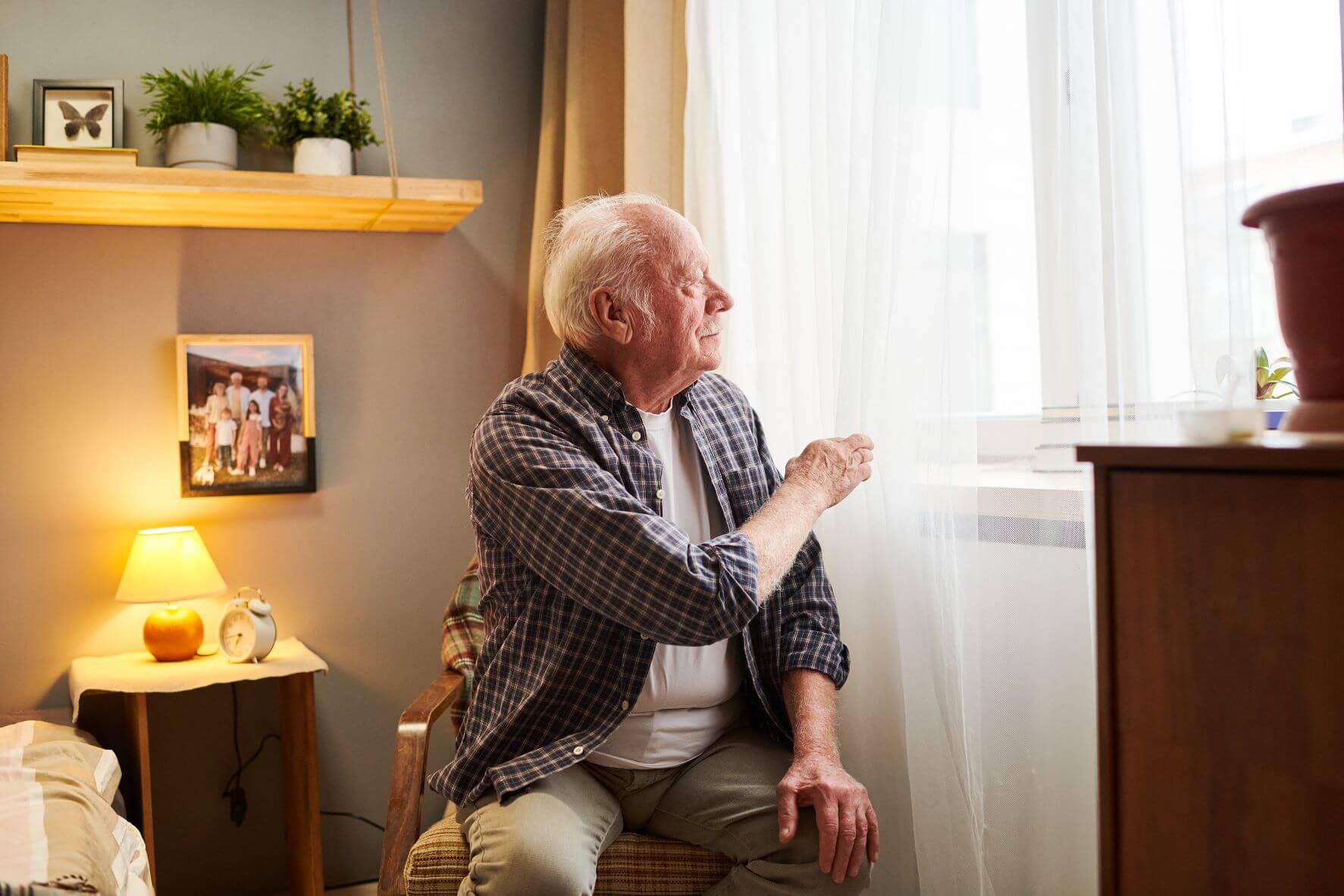Alzheimer’s IN-BETWEEN STAGE and the caregiver?
The Alzheimer’s In-Between Stage is when someone can no longer safely manage their lives without help, but they are not at the point they need someone to do everything for them. The Alzheimer’s caregiver is slowly moving into their new role, slowly becoming a fulltime Alzheimer’s caregiver.
An example would be my aunt. She was no longer able to drive or safely cook her own food. She watched tv most of the day and could manage her bathing, dressing, and eating on her own with minimal assistance from my mom. Without prompting, she could no longer pay the bills, make phone calls, plan /cook meals, or take care of herself.
She was no longer capable of living on her own, but she could function well living with someone. She lived this way for several years, in-between independence and needing someone to provide complete care, such as feeding, bathing, and toileting.

Alzheimer’s Caregiver & Safety
They are at very high risk for injury during this stage. Their vision field is shrinking, their depth perception is declining, and they are losing their ability to recognize objects.
Preventing injuries becomes one of your biggest concerns and highest priorities.
The In-between time is the most dangerous time of the disease process. It is when most accidents happen!
Studies show that approximately 25% of all hospitalized patients have dementia, and 26% are admitted for trauma/syncope/fall.
Most accidents happen in the kitchen and bathroom, but falls can happen anywhere. You can learn more about preventing injuries on these blog pages; Alzheimer’s safety, kitchen safety, bathroom safety, and fall safety.

The Alzheimer’s In-Between Stage can be a very difficult time for the Caregiver.
The Alzheimer’s In-Between stage can last for several years. This can be a difficult time for the person with Alzheimer’s and the caregiver. Family members are often unsure when and how to step in, especially if their loved one lives alone.
Anosognosia
Most often, it is a parent living alone, and their dementia is reaching the point they need their child to step in. However, it is awkward to be in, especially if they have Anosognosia.
It is when someone with Alzheimer’s or another form of dementia believes nothing is wrong with them. If they do not realize they have dementia, they will see no reason to leave their home.
Have the conversation
If your parent is living alone and has Alzheimer’s Disease, you will need to have a plan. At some point, you will need to intervene and make decisions regarding their living arrangements. They are going to need a fulltime Alzheimer’s caregiver at some point in this disease process.
I advise having that conversation soon after the diagnosis, involving them in the plan. At the same time, they can still make rational decisions. It will help the transition go smoother when it is time.
If you wait until they reach the point they are no longer able to live on their own and suddenly you are telling them they must move, it is not going to go well. No one likes being forced to do anything, especially when it comes to giving up their independence.
What are your options as an ALzheimer’s Caregiver?
There are a couple of options available when they can no longer live on their own. You can hire caregivers to take care of them in their home, move them into an assisted living facility (preferably one with a memory unit), or move them into your home.
Hiring caregivers can get very expensive. Some people start with a few hours a day, adding more hours as they continue to decline. Eventually, working into all night and then 24 hours a day. If money is not an issue, this works very well. Unfortunately, most people cannot afford this option.
There are many assisted living facilities now, and they are building more every day. They vary in cost and what they provide. Most of them are private pay. The price in my area ranges from $3500 to $7500 a month. The rules, regulations, costs, and state-provided financial supplementing will vary from state to state.
Are you ready to move them into your home and become a fulltime Alzheimer’s Caregiver?
Many families move their loved ones in with them. There are several things to consider as you are trying to decide when and where to move them.
Does your home have enough space? They need to have some room to call their own. If you have children, the noise may increase agitation. They will need a quiet place they can retreat to if needed.

Your routine will change drastically as the disease progresses. Alzheimer’s does not simply forget, but it is brain failure. It is essential you know what to expect.
Do you have a plan for support & resources to help you?
Will there be someone to cover for you so you can leave the house?
At some point, they will become chair bound and then bed-bound.
They will also need to be fed every meal and will need their diapers changed several times a day.
Do you have help for when that time comes?


Have a Plan that includes a fulltime Alzheimer’s caregiver
You will need to begin developing your plan as soon as an Alzheimer’s diagnosis is made. Remember to discuss it with them and include them in the planning. You really shouldn’t wait until it reaches the point where you find yourself in a bind, and you must move them quickly.
I have a close friend whose father was in the In-Between stage. Her mother died suddenly, and there was no plan in place for her father. So the next several months were very chaotic.
The kids tried taking turns staying in the house with him, but that didn’t work well with their families. Next, they tried moving him in with one of them, but that didn’t work either.
They pooled their money and moved him into an assisted living facility. He was lost without his wife, and he declined very rapidly. He ended up in the hospital and passed away a few months after his wife passed.
Please have a plan and a backup plan!

Disease Progression
The progression of the disease really depends on the type of dementia they have. I have seen some decline very quickly and others with a slow steady decline over a decade or more.
As they continue to decline you will need to make changes to your home life and possibly move them into a nursing home if you don’t have the resources to take care of them at home. At some point they move from the In-between stage to Complete Care, needing a full-time Alzheimer’s caregiver.
Complete care comes in the later stage of the disease. Complete care is when they need to be fed every meal, are incontinent of bowel and bladder all the time and need their diapers changed several times a day. They are either chair bound, or bed bound at this point and unable to get themselves around without physical assistance.
It is a good idea to assess and track the changes dementia is causing in them quarterly.
This can be done with the Alzheimer’s progress form in the Caregivers Notebook. It was designed to help you recognize when they are moving into the later stage from the Alzheimer’s In-between stage.
Tracking their changes will help you prepare for the next stage and get the help you need in place before they need complete care.
Feel free to explore our Article Library for more information and resource
Exploring Caregiving Tools & Resources? Don't Forget to Check Out My Resource Page! 🌟
Hi, I'm Larea, I am a Registered Nurse specializing in Dementia Care, with 30 years of experience supporting dementia patients and their families. Over the years, I have provided care in diverse settings, including homes, hospitals, nursing homes, assisted living facilities, and hospice. My passion is guiding caregivers, sharing my knowledge and experience to help them navigate the challenges of dementia care with confidence and compassion.







